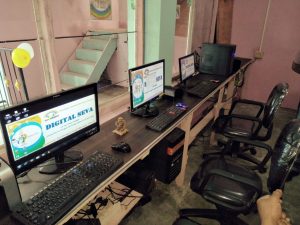 Approaching Women’s Day, Sanghamitra Kar P treads into the terrain of technology, and its many challenges among women entrepreneurs in the state.
Approaching Women’s Day, Sanghamitra Kar P treads into the terrain of technology, and its many challenges among women entrepreneurs in the state.
Over the last decade, entrepreneurship in India has been taken over by storm. From 3,000 in startups in 2014, it went over to 11,000 in 2020. However, what remains surprising is the representation of women in this sphere. India ranks 57 out of 65 for women’s entrepreneurship globally, with only 2.16% of women participating in early-stage entrepreneurial activities, according to the State of India’s Livelihood Report by Access Publications.
However, while the women in Meghalaya have always stood tall, in the growing world of Internet economy, the younger-generation of women entrepreneurs in the state are struggling to compete with interstate brands, access to financial capital, increased overhead expenses due to logistical issues, among others.
 Rose Kharsyntiew’s usual day starts at 8 in the morning when she opens up her Common Services Center (CSC) in her remote town Mairang, located 40 kilometres away from Shillong. She caters to at least 400 customers in a day fulfilling various e-services such as driving licence, insurance, pension among others.
Rose Kharsyntiew’s usual day starts at 8 in the morning when she opens up her Common Services Center (CSC) in her remote town Mairang, located 40 kilometres away from Shillong. She caters to at least 400 customers in a day fulfilling various e-services such as driving licence, insurance, pension among others.
A CSC is an initiative by the Indian Government which essentially is a kiosk with a personal computer which allows localities to access e-services through a village level entrepreneur (VLE). The VLE earns a share of the revenue gained by the CSC.
“There is hardly any Internet connectivity in these villages which are around 10-20 kilometres from here. So they come here to pay their bills, process their documents,” says Kharsyntiew. She often drives to these villages also to understand their needs on digital services.
“The terrain is not easy. The roads are broken, and there are no lights. But, most of them don’t know how to use a smartphone, so they need to be made aware, which is why we often visit them.”
 But Kharsyntiew’s primary problem is during the monsoon season in the state which is known to be one of the wettest places on Earth. “We do not have power for 3-4 hours in a day. So we cannot carry on with the work. When it’s urgent, I spend double the amount on my mobile data to do these tasks, but it is still so slow.”
But Kharsyntiew’s primary problem is during the monsoon season in the state which is known to be one of the wettest places on Earth. “We do not have power for 3-4 hours in a day. So we cannot carry on with the work. When it’s urgent, I spend double the amount on my mobile data to do these tasks, but it is still so slow.”
After acquiring licences and starting her centre around a decade back, today she earns about Rs 2,000 or more in a day and employs seven people which clearly distinguishes her in the town. But, she hasn’t been able to expand her services, due to lack of funding. “I need to invest my money for every small thing to run this centre. Expanding this centre has been the biggest challenge. I have applied through multiple government schemes to secure funding, but to no avail. Securing loans from banks has also not been easy.”
Kharsyntiew adds, “We also need to build facilities like a computer training program and exam room where students can sit for online exams otherwise they have to travel to other states for these exams.”
 On the sidelines, she also makes sanitary pads, and LED bulbs which are sold in the nearby villages. She even trains the young generation on how to make pads, open CSC centres in other rural areas, provides computer training and so on.
On the sidelines, she also makes sanitary pads, and LED bulbs which are sold in the nearby villages. She even trains the young generation on how to make pads, open CSC centres in other rural areas, provides computer training and so on.
Unlike in other parts of India where becoming an entrepreneur in a predominantly male dominated sphere is an uphill battle, Kharsyntiew or other women entrepreneurs did not find it unusual to start their own venture as they have grown in Meghalaya seeing women who not only participate but dominate the trade and business. Be it marketplaces, or government offices, women are seen in every nook and corner of the state, reflecting the state’s matrilineal culture.
However, the challenge for these young women was to set up or expand their digital businesses in the state due to lack of infrastructure, capital, logistical issues among others.
“Starting online businesses is not easy here. It took me three years to understand and bring stability to my business because I can’t find a lot of things here. And connecting with someone from the metro cities is not always possible for us. Lot of them who want to start such a business come to me now, with their doubts on licences, sourcing partners etc,” says Dasumarlin Majaw who started Smoky Falls Tribe Coffee in 2015.
 However, Nambie Jessica Marak says that when she returned to Meghalaya, she was certain about opening an online business, as she did not possess the capital or would not be able to man an offline store. However, even running a small online pickling business, from her village which is around 60 kilometres away from the nearest town, is very tough.
However, Nambie Jessica Marak says that when she returned to Meghalaya, she was certain about opening an online business, as she did not possess the capital or would not be able to man an offline store. However, even running a small online pickling business, from her village which is around 60 kilometres away from the nearest town, is very tough.
“I had to trek every day just to get an update on my phone or emails. I would trek up to this hill and then catch the neighbouring Assam state’s mobile network. It would take about half an hour for me to get there. From there, I would upload videos. Even a four minute YouTube video would take at least three hours while I’m standing in the mountain, in the dark. It becomes even harder, during the summer or monsoon with all the mosquitoes,” says Marak who recently became the first runner-up of “MasterChef India 2023”.
She says that over the past 5-6 years, she has been publishing content on her Youtube channel ‘Eat Your Kappa’ this way. It only changed last year around April when her village got a mobile network. “Now we are all reachable but when the electricity goes off, there is again no network.”
Her problems don’t end there. She says how logistics’ delivery men pick up parcels for delivery in other towns and cities, she has no such option. “I book the couriers, then drive down to a town in Assam which is around 45 minutes.. And then I call up my pickup person who comes to pick it. Otherwise I have to go to another town which is further about 10-15 kilometres away to courier the parcel.”
 Adding to this, Ayoshee Beriwal, founder of GreeNE Origins said, “If I courier something from Guwahati (100km away from Shillong)–it would cost half of what I pay from Meghalaya. We are even talking to the state Government to resolve this issue.”
Adding to this, Ayoshee Beriwal, founder of GreeNE Origins said, “If I courier something from Guwahati (100km away from Shillong)–it would cost half of what I pay from Meghalaya. We are even talking to the state Government to resolve this issue.”
Ex-Google employee Catherine Dohling who started the online Northeast Store along with her husband Trideep Rabha, has a different take. “The shipping and handling charges are the most expensive costs here. We have also started express shipping which takes around 2-3 days for a delivery in metro city. But, if the product reaches too soon, the customers also get suspicious, if it’s fake or how did it come from the Northeast so fast?,” Dohling laughs.
But, delivering perishable items adds to the challenge. “We have experienced when the items have been damaged, so we are more cautious about our packaging now,” says Dohling.
She says that when the duo started the business, sourcing from sellers or ‘Kongs’ (meaning sister who would sell) was a challenge. “They did not understand e-commerce. But, we had to compete with other brands outside Meghalaya. So making them understand packaging, labelling quality was a challenge. We became more like consultants for them.”
 A common name among these women is Meghalaya Government’s program PRIME (Promotion & Incubation of Market-driven Enterprises) which was set up in 2020 to build a startup ecosystem in the state. It has helped these entrepreneurs with workspace, marketing, outsourcing materials, showcasing products in other states or outside the country among others.
A common name among these women is Meghalaya Government’s program PRIME (Promotion & Incubation of Market-driven Enterprises) which was set up in 2020 to build a startup ecosystem in the state. It has helped these entrepreneurs with workspace, marketing, outsourcing materials, showcasing products in other states or outside the country among others.
Majaw of Smoky Falls Tribe Coffee says her major challenge was to set up a website. “There were no website developers here whom I could rely on. Finally, I found a localite to do it, but it was not at all up to the mark. Even now, I am finding it so difficult to set up a functioning website.”
“My customers now come mostly through Instagram and WhatsApp,” said Majaw who now also delivers outside the country.
The entrepreneurs also say that logistics and supply-chain are some of the major challenges. Earlier it would take up to two weeks to deliver an order, says Majaw, which has now come down to at least five days via Amazon. “It also doubles up my cost when I courier from here.”
 Marak also says that sometimes the courier charges more than the item, which acts as a disadvantage as many customers then don’t place an order. “If I send it from Chennai or Delhi, the courier charges will be around 60-80 rupees, depending on the weight. But, from my hometown, if it’s around 1kg, it costs about 400-450 rupees, which is so expensive.”
Marak also says that sometimes the courier charges more than the item, which acts as a disadvantage as many customers then don’t place an order. “If I send it from Chennai or Delhi, the courier charges will be around 60-80 rupees, depending on the weight. But, from my hometown, if it’s around 1kg, it costs about 400-450 rupees, which is so expensive.”
These women have another common problem – outsourcing materials. “The packaging materials, even the boxes, we need to outsource it from other states, which increases the cost,” says Majaw.
Despite the challenges, these women are not yet ready to move outside Meghalaya. “The materials like lemon grass, bamboo shoot, and other vegetables which I use for my recipes are easily available and quite cheap here. And, I also find a lot of helping hands here, which won’t be easy outside,” says Marak.
If the state aims to create 5.5 lakh job opportunities in the next five years, entrepreneurs will be key in generating employment, and hence it is essential to foster this ecosystem.
Sanghamitra Kar P, an independent journalist based in Bengaluru, has previously worked with The Economic Times and Moneycontrol and her area of interest is on the changing internet culture that has been shaping society.



